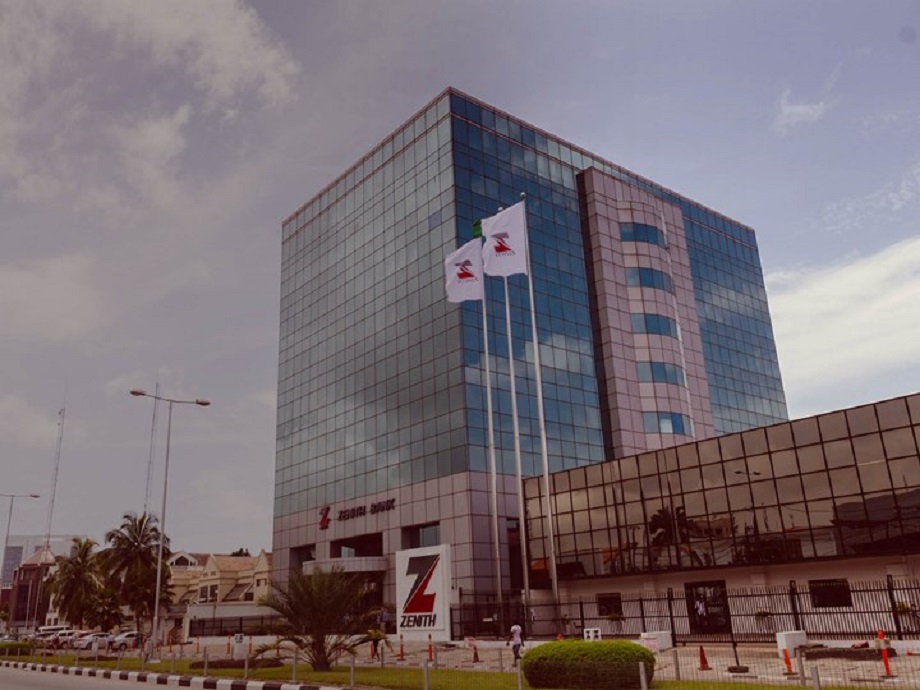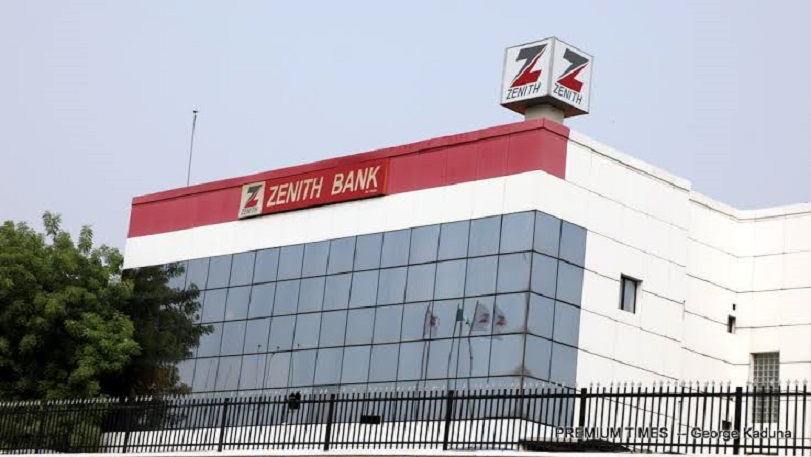Banking
Zenith Bank Shares Crash After Declaring 25k Interim Dividend

By National Daily
For a second session in a row last Friday, Zenith Bank shares depreciated despite a sharp rise in its first-half earnings.
Last Thursday, the lender announced that its pre-tax profit in the first six months jumped 71 percent to N92.2 billion.
Afterwards, the board of directors of the financial institution declared an interim dividend of 25 kobo, an amount some investors believed was lower than expected.
According to National Daily, Zenith Bank stock fell one percent to N23.75 on Friday, the lowest since July 26.
In May 2017, the bank raised $500 million Eurobond which could increase its funding costs.
Recall that the first tier lender Q2 2017 results showed that PBT grew by a remarkable 120% y/y to N48 billion. The strong PBT growth was mainly driven by a stellar growth of 389% y/y to N88.5 billion on the non-interest income line.
Growth on this line was underpinned by a strong performance in forex trading income which grew to N46 billion from a forex loss of N496 million in 2016. In contrast, funding income came in flat y/y.
The strong revenue contribution was strong enough to completely offset increases of 196% y/y and 39% y/y in loan loss provision and opex respectively.
Further down the P&L, PAT declined by 19% y/y to N31.4 billion mainly because of a negative result of N6.3 billion in other comprehensive income line (OCI) compared with a strong gain of N30.2 billion in Q2 2016 on the same line.
On a sequential basis, the results mirrored the y/y trends. PBT was up by 9% q/q.
Again, robust growth of N199% q/q on the non-interest income line was the key driver underpinning the q/q growth in PBT. PAT fell by -19% q/ because of the negative result on the OCI line.
Compared with our forecasts, PBT beat by 22%.
However, PAT was broadly (-4%) in line with our N32.8 billion forecast.
In terms of the H1 performance, PBT and PAT expanded by 71% y/y and 8% y/y to N92.2 billion and N70.3 billion respectively.
Although both revenue lines contributed to the strong results, non-interest income which grew by 254% y/y was the major driver. The y/y growth on the funding income line was 9% y/y.
The company is proposing an interim dividend of N0.25 which is flat y/y and in line with our expectations. The proposed dividend translates to a dividend yield of 1.0% and a payout ratio of 11.2%.
While the strength of the non-interest income result will be welcomed, we believe the weakness on the funding income line and the spikes in impairments and opex will also attract investors’ attention.
On funding income, it appears that Zenith Bank also may have struggled to capitalise (effectively) on the elevated yields in the fixed income market because sourcing deposits may have been trickier, and the workings of the NAFEX forex market may also have led to a loss of funds from customers.
Its deposits fell -1% q/q. Pending comments from management, we believe that the bank may have capitalised on the strong set of results to book significantly higher provisions. It is not clear why opex jumped 55% q/q.
Zenith Bank’s H1 PBT tracks well ahead of consensus FY 2017 PBT forecast of N165 billion. As such, we expect to see marked upward revisions to consensus PBT forecast. The shares have outperformed the Index this year. They have gained 62.7% ytd vs. 41.8% ytd for the ASI.
Banking
Public Offer: Sterling Holdco Allots 13.812 billion Shares to 18,276 Shareholders

By Aduragbemi Omiyale
Sterling Financial Holdings Company Plc has allotted shares from its public offer of 2025 to investors with valid applications.
The allotment follows the earlier receipt of final approval from the Central Bank of Nigeria (CBN) and the recent clearance by the Securities and Exchange Commission (SEC).
In September 2025, the financial institution offered for sale about 12,581,000,000 ordinary shares of 50 kobo each at N7.00 per share in public offer.
However, the exercise received wide participation from the investing public, with the company getting 18,280 applications for 16,839,524,401 ordinary shares valued at approximately N117.88 billion.
Following a thorough verification process, valid applications were received from 18,276 shareholders for a total of 13,812,239,000 ordinary shares, representing a subscription level of 109.79 per cent and reflecting sustained confidence in Sterling Holdco’s strategic direction, governance, and long-term growth prospects.
The firm approached the capital market for additional funds for the recapitalisation of its two flagship subsidiaries, Sterling Bank and The Alternative Bank.
The capital injection will support the commencement of full operations and contribute to the group’s revenue diversification objectives.
In line with the guidelines set out in the offer prospectus, Sterling Holdco confirmed that all valid applications will be allotted in full. Every investor who complied with the terms of the offer will receive all the shares for which they applied.
A very small number of applications were not processed or were partially rejected due to non-compliance with the offer terms, including duplicate payments and failure to meet the minimum subscription requirement of 1,000 units or its multiples, as stipulated in the offer documents.
The group ensures a seamless post-offer process, with refunds for excess or rejected applications, along with applicable interest, to be remitted via Real Time Gross Settlement or NIBSS Electronic Funds Transfer directly to the bank accounts detailed in the application forms.
Simultaneously, the electronic allotment of shares has be credited to successful shareholders’ accounts with the Central Securities Clearing System (CSCS) on February 17, and for applicants who do not currently have CSCS accounts, their allotted shares will be temporarily held in a registrar-managed pool account pending the submission of their completed account opening documentation to Pace Registrars Limited, after which the shares will be transferred to their personal CSCS accounts.
Banking
CBN Governor Seeks Coordinated Digital Payment Reforms

By Modupe Gbadeyanka
To drive inclusive growth, strengthen financial stability, and deepen global financial integration across developing economies, there must be coordinated reforms in digital cross-border payments.
This was the submission of the Governor of the Central Bank of Nigeria (CBN), Mr Olayemi Cardoso, at the G‑24 Technical Group Meetings in Abuja on Thursday, February 19, 2026.
According to him, high remittance costs, settlement delays, fragmented systems, and heavy compliance burdens still limit the participation of households and Micro, Small and Medium Enterprises (MSMEs) in global trade.
The central banker emphasised that efficient payment systems are essential for economic inclusion, highlighting that global remittance corridors still incur average costs above 6 per cent, with settlement delays of several days, excluding millions from modern economic activity.
Mr Cardoso cautioned that while digital payments present significant opportunities, they also carry risks such as currency substitution, weakened monetary transmission, increased FX volatility, capital-flow pressures, and regulatory fragmentation.
The G-24 TGM 2026, themed Mobilising finance for sustainable, inclusive, and job-rich transformation, convened global financial stakeholders to advance the modernisation of finance in support of emerging and developing economies.
The CBN chief reaffirmed Nigeria’s commitment to working with G-24 members, the IMF, the World Bank Group, and other partners to build a more inclusive, resilient, and development-oriented global financial architecture.
“We have strengthened our AML/CFT frameworks in line with FATF guidelines, requiring strict dual-screening of cross-border transactions to mitigate risks.
“To deepen regional integration, the CBN introduced simplified KYC/AML requirements for low-value cross-border transactions to encourage broader participation in PAPSS, easing processes for Nigerian SMEs and enabling faster intra-African trade payments.
“We have also embraced fintech innovation through our Regulatory Sandbox, allowing payment-focused fintechs to test secure, instant cross-border solutions under close CBN supervision,” he disclosed.

Banking
Unity Bank, Providus Bank Merger Awaits Final Court Approval

By Modupe Gbadeyanka
The merger and business combination between Unity Bank Plc and Providus Bank Limited remains firmly on course, a statement from one of the parties disclosed.
According to Unity Bank, there is no iota of truth in reports in certain sections of the media suggesting that the merger process had stalled, as the transaction remains firmly on track.
It was disclosed that the necessary regulatory steps have been completed, but only a few other steps to finalise the transaction, especially the final court sanction.
There had been speculations that both lenders may not meet the new minimum capital requirement of the Central Bank of Nigeria (CBN) before the March 31, 2026, deadline.
However, it was noted that the combined capital base of Unity Bank and Providus Bank exceeds N200 billion, which is the minimum requirement to retain a national banking licence under the CBN’s recapitalisation framework.
When completed, the Unity-Providus merger is expected to deliver a stronger, more competitive, and customer-centric financial institution — one with the scale, innovation, and reach to redefine the retail and SME banking landscape in Nigeria.
“The merger with Providus Bank significantly enhances our capital base, operational capacity, and strategic positioning.
“We are confident that the combined institution will be better equipped to support economic growth and deliver innovative financial solutions across Nigeria,” the chief executive of Unity Bank, Mr Ebenezer Kolawole, stated.
Recall that a few months ago, shareholders authorised the merger between the two entities at Court-Ordered Meetings. They also adopted the scheme of merger at their respective Extraordinary General Meetings (EGMs) in September 2025,
The central bank also backed the merger, with a pivotal financial accommodation to support the transaction. The merger also received a further boost with a “no objection” nod from the Securities and Exchange Commission (SEC).
The regulatory approvals form part of broader efforts to strengthen the resilience of Nigeria’s banking system, reinforce capital adequacy across the sector, and mitigate potential systemic risks.
The development positions the combined entity among the 21 banks that have satisfied the apex bank’s new capital threshold for national banking operations.
-

 Feature/OPED6 years ago
Feature/OPED6 years agoDavos was Different this year
-
Travel/Tourism10 years ago
Lagos Seals Western Lodge Hotel In Ikorodu
-

 Showbiz3 years ago
Showbiz3 years agoEstranged Lover Releases Videos of Empress Njamah Bathing
-

 Banking8 years ago
Banking8 years agoSort Codes of GTBank Branches in Nigeria
-

 Economy3 years ago
Economy3 years agoSubsidy Removal: CNG at N130 Per Litre Cheaper Than Petrol—IPMAN
-

 Banking3 years ago
Banking3 years agoSort Codes of UBA Branches in Nigeria
-

 Banking3 years ago
Banking3 years agoFirst Bank Announces Planned Downtime
-

 Sports3 years ago
Sports3 years agoHighest Paid Nigerian Footballer – How Much Do Nigerian Footballers Earn





















